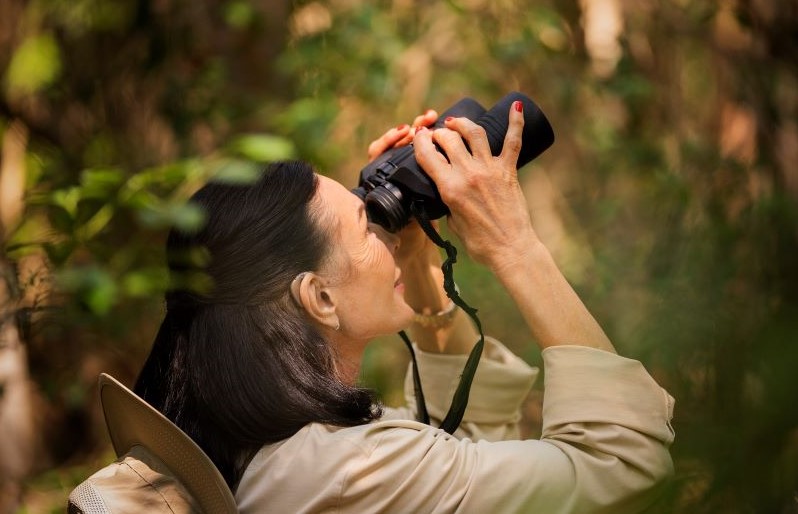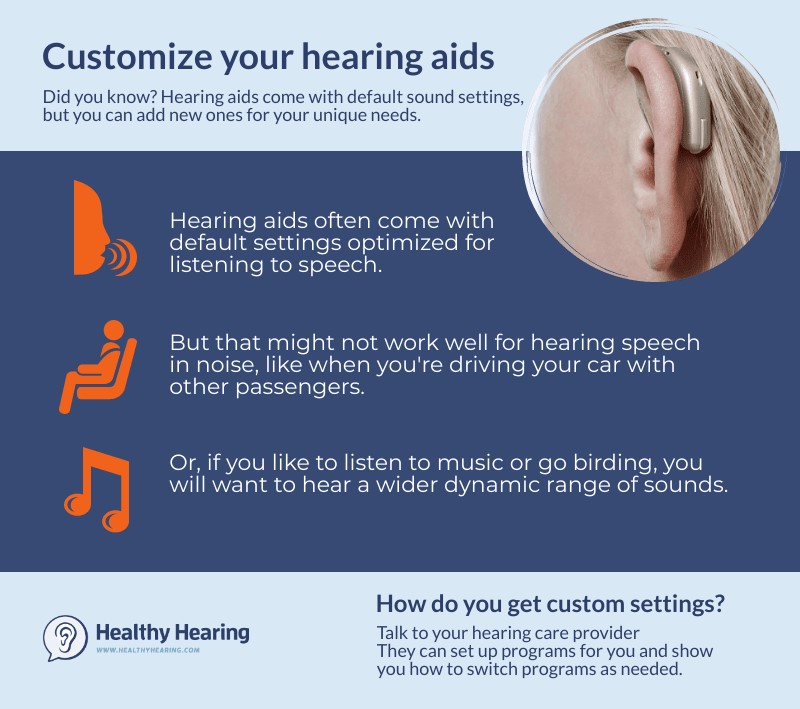|
www.HealthyHearing.com |
Birding with hearing loss: How hearing aids helpHigh-frequency hearing loss makes it harder to hear birdsong
Contributed by Temma Ehrenfeld Key points:
If you have age-related hearing loss or noise-induced hearing loss, you might not be able to hear the high-pitched songs of birds. This is because over time, loud noises and aging can damage the tiny hair cells in our ears that detect sound. The first hair cells to get damaged are those that can detect high pitches. This damage is irreversible. The good news? Hearing aids can help, especially if you add a custom setting for birdsong. Test your hearing: Can you hear these birds?One way to test if this has become an issue is to listen to these modified audio samples of birds, which are first played at their normal frequency and then subsequently adjusted to lower pitches. If they get progressively easier to hear as the recording plays, it's a strong indication your ability to hear natural birdsong is impacted, because you struggle to hear higher pitches. How hearing loss affects hearing birders
Inability to hear birds at all: You may not even hear certain birds at all, especially those with really high-pitched calls and trills that are in the distance. Directionality: You also may struggle with direction, finding it hard to pinpoint where the bird sound is coming from. cated. Distinguishing songs: Another problem might be hearing only the low pitches in a song that mixes high and low notes. This can make it harder to distinguish different bird songs, notes Nathan Pieplow, the faculty sponsor for the Bird Club at the University of Colorado. He explains that two high notes distinguish the “fee-bee, fee-bay” song of the Carolina Chickadee from the “fee bee” sound of a Black-capped Chickadee. If you can’t hear very well above 6 kHZ, you’ll miss them. Loss of dynamic range: High-frequency hearing loss also could make a harmonically complex nasal tone sound simpler, he observed. How hearing aids can help birdersMost of us get hearing aids to hear human voices more clearly, and our aids are programmed accordingly. So let your audiologist know if you’re a birder; they can set up a custom hearing aid setting for you. You can enhance the higher notes on a specific setting or choose a brand of hearing aid that is more precise. In general, the more premium models by all the major hearing aid manufacturers can be programmed for very specific settings.
What birders have to say about hearing aidsWith her especially programmed hearing aids, Laura Erickson in Duluth, Minnesota, the author of 12 books about birds and a columnist for BirdWatching magazine, writes that she’s better able to hear Cedar Waxwings, Golden-crowned Kinglets, Brown Creepers, and Blackburnian, Cape May, and Blackpoll Warblers. Her aids also help her distinguish bird sounds against background noise like a loud wind or wave. "I love my hearing aids, but they’re not perfect," she shared. "I can’t hear a Le Conte’s Sparrow anymore even with them, unless I'm so close that I could see it with my bare eyes anyway." Newer hearing aids may work better for fast sound processingSmall birds move super fast. Hearing aids may take 5-8 milliseconds to process sound. The delay can register as an unnatural sound. However, the newest aids are faster, processing sound in as little as half a millisecond. For a serious birder, that slight difference may be meaningful. If you can, try out a new pair of hearing aids on a birdwatching expedition. You should have an option to return them if you are dissatisfied. Hear Birds Again app: Real-time adjustmentsYou can also use a smartphone app to make it easier to hear high-pitched birdsong. Lang Elliott, a nature recordist, launched Hear Birds Again app, which is open-source and free for anyone to use. The app lowers the frequency of birds in real time. Mild hearing loss? Consider a sound amplifierIf your hearing loss is too mild for you to consider using a hearing aid regularly, you may want to buy a personal sound amplifier, which cost much less than hearing aids. David Benson, a National Park Service Ranger Naturalist in Glacier National Park, in Montana, tried out three brands and ultimately decided to keep Etymotic Beans, which he writes gave him the best ability to both hear birds and then find them. “They’ve proven through my tests and through lots of time in the field that they really help me hear the birds,” he writes. “And, importantly, they help me find the birds after hearing them.” |
Featured clinics near me
Earzlink Hearing Care - Reynoldsburg
7668 Slate Ridge Blvd
Reynoldsburg, OH 43068

Find a clinic
Need a hearing test but not sure which clinic to choose?
Call 1-877-872-7165 for help setting up a hearing test appointment.


